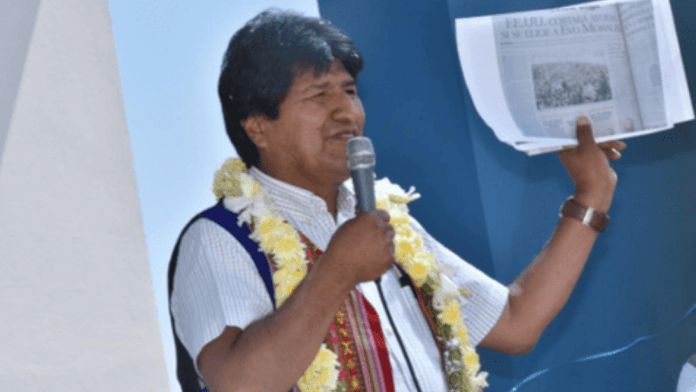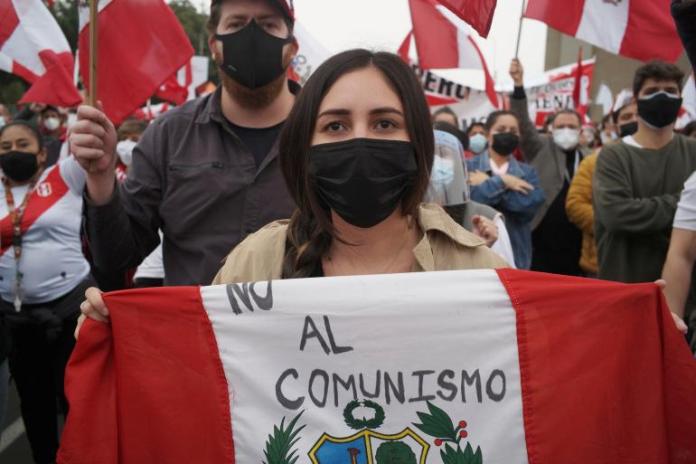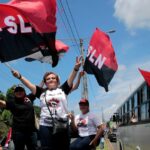
By Nan McCurdy and Nora McCurdy – Jul 19, 2021
Plan follows precedent of 1970s state-sponsored assassination campaign targeting leftists.
Operation Condor was a U.S.-directed secret intelligence program in the 1970s and early ’80s in six South American U.S.-backed dictatorships—Chile, Argentina, Brazil, Bolivia, Uruguay and Paraguay—that resulted in the torture and “disappearance” of thousands of people.
The victims included dissidents and leftists, union and peasant leaders, priests and nuns, students and teachers, intellectuals and suspected guerrillas.

In a speech in early July, Morales stated:
“The sending of war materials by the former presidents of Ecuador (Moreno), and Argentina (Macri), and the letter of thanks from General Terceros are further evidence that, together with the assassination of the President of Haiti, by former Colombian military personnel, show the execution of a second Condor Plan under U.S. direction.
We alert the Latin America social movements about #PlanCóndor2 and the need to strengthen the struggle for peace with social justice and democracy to preserve the sovereignty and independence of our States and the dignity of the people.
In the face of the Bolivian right wing and its U.S.-paid media that lie and do not show a single piece of evidence of the alleged fraud [2019 elections], more evidence continues to appear about those who participated in the 2019 coup d’état and the support given by anti-popular governments with war material and money.
We reaffirm that #PlanCóndor2 is under way and we must agree on measures so that the right-wing governments of Latin America do not continue to participate in coups d’état under the leadership of the United States, causing mourning and pain to our peoples.
We warn the people, militants, sympathizers, patriotic military and professionals committed to their country: We are in the sights of the U.S. because we recovered our natural resources, nationalized strategic companies and closed the military base in Chimoré. They do not forgive us.”
Cuba—On the New Condor Hit List
That the new Operation Condor represents an extension of the old one is evident in Washington’s continued subversion efforts directed against Cuba, a country that has defied U.S. imperial designs since the 1959 Cuban revolution.
As CAM reported, on June 23 of this year 184 countries of the United Nations General Assembly voted in favor of an end to the U.S. embargo on Cuba. It was the 29th consecutive year where virtually all countries, except the U.S. and Israel, made this demand.
In recent years, the Cuban media have denounced the millions of dollars of U.S. funding, through organizations like the National Endowment for Democracy (NED), to create and fund opposition media and the organization of youth.
The NED programs are an adjunct of the new Condor operation, whose goal is regime change of left-wing governments.
Cuban President Miguel Díaz-Canel Bermúdez on July 11 rejected the smear campaigns of the U.S. media hegemony in the midst of the Covid pandemic with the intensification of the illegal economic, financial and commercial blockade imposed by the United States.

The U.S. is intensifying the blockade hoping to cause an internal implosion. “They want to suffocate us and try to put an end to the Revolution … I am giving this information to ratify that the streets belong to the Revolution; that the party and the Government have all the disposition to debate and help,” said President Díaz-Canel.


“The financial, economic, commercial and energy persecution increased, they [Washington] want to provoke internal social problems in Cuba in order to call for humanitarian missions that translate into military invasions and interference,” denounced President Díaz-Canel. The president recalled that Cuba was included in the infamous list as sponsors of terrorism, “a unilateral list; they believe they are emperors of the world,” he added.

According to historian J. Patrice McSherry, Peru was one of the target countries for the original Operation Condor. In June 1980, Peruvian President General Enrique Morales Bermudez (1975-1980) collaborated with Argentine security forces in hunting down Argentine leftists in Peru who were tortured and “disappeared.”
The U.S. later provided security assistance to help Peruvian President Alberto Fujimori (1990-2000) destroy the left-wing Sendero Luminoso guerrilla movement.

Bill Clinton and Alberto Fujimori in the White House. [Source: aparchive.com]Fast forward two decades, and Washington appears to be pulling out all the stops under the new Condor to try to orchestrate a coup designed to empower Alberto’s daughter, Keiko—who like her father, would advance policies that favor Peru’s wealthy classes and transnational corporations.




On June 30, just a week before the assassination of President Jovenel Moïse, William J. Burns, the head of the Central Intelligence Agency, arrived in Colombia to participate in a “sensitive” security mission.
The Colombian ambassador in Washington, Francisco Santos, reported on the CIA director’s trip to Colombia, but said he did not want to give further details about Director Burns’s visit to Bogota: “I prefer not to tell you, it is a delicate mission, an important intelligence mission that we were able to coordinate,”responded Santos when questioned about the mission.

RELATED CONTENT: NGOs and the New Plan Condor for Latin America
Moïse to be sure was no progressive. He was groomed by the corrupt former president Michel Martelly, a close ally of the Clintons, and received only 11 percent of the vote in 2016.
In a March interview, former U.S. ambassador to Haiti Pamela White talked about a plan to “put aside” President Moïse, leaving power in the hands of an interim Prime Minister. All this to avoid democratic elections which the population have been calling for since early 2020.



There has been no presentation of what was found on security cameras—neither from the President’s home nor from any neighboring homes. And now the police are saying that a progressive Haitian doctorwho lives in the U.S. and has had pretensions of running for president in the past was the mastermind. This scenario being pushed by the Haitian Police wreaks of a cover-up—as had occurred with many of the assassinations in the original Operation Condor.
Nicaragua–1980s Redux?
In Nicaragua, U.S. policies under the new Condor show great continuity from the era of the 1980s Contra War.
In 2018, with careful direction and millions of dollars from U.S. agencies and foundations, a coup was attempted against Nicaragua’s government—headed by the original Sandinista revolutionary leader, Daniel Ortega, who had won the 2016 elections with over 72% of the vote.[1]
The failed coup attempt left more than 260 people dead, including 24 police.
Along with executions, hundreds of Sandinista supporters and government workers were kidnapped and tortured. With destruction of government and private buildings, vehicles and equipment, loss of 130,000 jobs and business closures, Finance Minister Ivan Acosta calculates the cost to the economy of more than a billion dollars—more than the combined losses caused by the Covid pandemic and the two devastating hurricanes of November 2020.


RELATED CONTENT: Italy Confirms Life Sentences For ‘Plan Cóndor’ Coup Officials
Since June of this year more than 20 Nicaraguans involved in these unlawful and potentially treasonous activities have come under investigation.
The offenses they are accused of committing involve not only possible treason for organizing, financing and participating in a coup d’état, requesting foreign economic and even military aggression, and promoting coercive measures against the government and individual citizens.
Additionally, some are under investigation for money laundering, financial fraud relating to abuse of non-profits, and the law on registration and financial reporting as foreign agents, similar to the U.S. FARA legislation. Moreover, among the detained are people who, by engaging in this broad range of law breaking, violated the terms of the Amnesty Law from which they benefited in 2019.
Venezuela—Trying to Destroy the Lifeblood of the Bolivarian Revolution
Nicaragua had been designated by the Trump administration as part of a “troika of tyranny” along with Cuba and Venezuela.
Venezuela’s socialist president Nicolás Maduro, on July 12 at a dialogue with National Assembly lawmakers, denounced two assassination attempts against his life in just the preceding two weeks. Maduro stated: “They had prepared an attack against me on June 24 in the bicentennial of Carabobo this year. Another attack with drones, we dispelled it, we knocked it down, we neutralized it. First time I say it, because the investigation is still ongoing until we get to the person behind everything.
They had prepared [yet another] a desperate attack against me on July 5 in the middle of the parade …” referring to the July 5th Independence Day civic-military parade.

In May 2020, a large group of U.S.-funded terrorists, including two U.S. citizens, after training in Colombia, entered Venezuela by boat, hoping to kidnap or assassinate President Maduro. Their presence was quickly reported by local fishing workers and the group was intercepted by the Venezuelan authorities.


Maduro’s statement comes in relation to the arrival in Colombia of the commander of the Southern Command, Admiral Craig Faller, and the director of the CIA, William Burns, whose visit, as the Colombian ambassador to the U.S. explained, was a “delicate mission,” taking place right before criminal attacks in Haiti and Venezuela.

President Maduro noted, “We have received Information … they are behind plans to continue threatening and attacking peace and democracy, the institutions and the leadership of our country.”
The Venezuelan government’s warnings about the continuing conspiracies, violence and preparation of mercenary groups in Colombia to attack Venezuela were borne out recently by attacks in Venezuela’s capital. Various criminal gangs staged attacks in different parts of Caracas including one on an important police center.
The attacks were clearly coordinated to create a climate of fear and uncertainty during a visit by a European Union delegation to assess the possibility of EU observers monitoring the important elections scheduled for later this year.
The Venezuelan security forces took action to control the areas under attack and dismantled the criminal gangs responsible.

Evo Morales among others has made clear that the U.S. elites and their regional allies are desperate to impose a new Plan Condor in Latin America and the Caribbean.
Historically, the U.S. has always sought to suppress regional emancipation in the form of progressive movements and governments. But in a global context, they now also fear the growth of the region’s economic links with Asia, especially China.
Despite their enormous political influence, economic power and military presence, the U.S. and its allies face a losing battle, just as Spain did 200 years ago.
One model of U.S. and allied control is the kind of anti-democratic intervention developed in Haiti and Honduras by the U.S., Canada and Western Europe. This model ensures a neutered, corrupt central government and neocolonial rule via international agencies and Western NGOs.
But the collapse of Haiti and Honduras into neocolonial subjugation is still mostly an exception in the region. Apart from Haiti, the other Caribbean nations have proven to be very resilient against U.S. pressure, consistently blocking moves against Venezuela by the U.S. and Canada in the Organization of American States (OAS), for example.
Also Nicaragua’s decisive 2012 legal victory regaining over 90,000 square kilometers of Caribbean maritime territory, usurped by Colombia for decades, has meant that Nicaragua has joined Cuba and like-minded progressive Caribbean island nations in regional bodies, reinforcing the presence of revolutionary influence in those forums.
In practice, that means promotion of development policies focused on people rather than on corporate profits.


Haiti and Honduras may for now have become tragic showcases of what the U.S. and its allies want to impose on Latin America and the Caribbean but Bolivia’s heroic people showed that even a successful right-wing coup can be reversed.


Nora McCurdy is Nicaraguan, she is an independent investigator, she can be reached at noramccurdy@gmail.com.
Featured image: Evo Morales speaks in Cochabamba in 2017. [Source: telesurenglish.net]

Nan McCurdy
Nan McCurdy is a United Methodist missionary with the General Board of
Global Ministries. She and her missionary husband, Miguel Mairena, are
serving as Mission Advocates for the Western Jurisdiction of The United
Methodist Church.
- Nan McCurdy#molongui-disabled-link
Tags: Bolivia Caribbean Central America Cuba Evo Morales feature Haiti Nicaragua Operation Condor Peru South América US Imperialism Venezuela
Share this:
- Click to share on Twitter (Opens in new window)
- Click to share on Facebook (Opens in new window)
- Click to share on LinkedIn (Opens in new window)
- Click to share on WhatsApp (Opens in new window)
- Click to share on Reddit (Opens in new window)
- Click to share on Telegram (Opens in new window)
- Click to email a link to a friend (Opens in new window)





You must be logged in to post a comment.